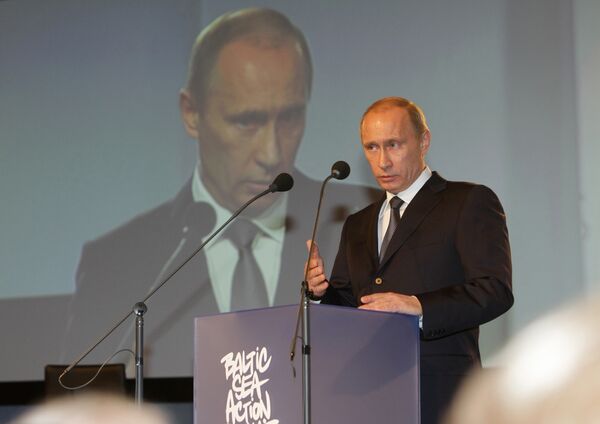MOSCOW. (RIA Novosti political commentator Andrei Fedyashin) - As luck would have it, a great many top Russian officials come from St. Petersburg, which means that they can persuade the federal government and local authorities to tackle the problems of the Baltic, Europe's most polluted inland sea.
Moreover, the decision to build the Nord Stream gas pipeline, which will link Russia and Germany via the Baltic Sea, encourages projects focused on environmental protection.
On February 9, Russian Prime Minister Vladimir Putin, who also grew up on the Baltic coast, addressed the Baltic Sea Action Summit (BSAS) in Helsinki, Finland. The summit involved about 400 delegates from littoral states, including heads of state and government, academics, politicians, analysts and representatives of various organizations. Their aim is to address regional pollution issues.
The delegates listened with particular attention to Putin, who had a double reason for attending the event.
First of all, Putin took advantage of this opportunity to once again tell the European Union that the Nord Stream pipeline will be reliable, and that it will not threaten the marine environment. This is mostly true. Although project Nord Stream was not on the agenda, the summit prioritized it, and with good reason.
Nord Stream has already passed all expert checks and has received almost all permits from Denmark, Sweden, Finland, Russia and Germany involved in the project. The Finnish government approved the project in November 2009, and the West Finland Regional Environment Center is now expected to give the green light.
Finnish Prime Minister Matti Vanhanen is saying the decision will be made in the next few days, but that he is unable to predict what it will be. The Russian Prime Minister's speech will probably facilitate a positive outcome.
Putin's second motivation is that Russia is going to chair the Baltic Marine Environment Protection Commission, also known as HELCOM or Helsinki Commission, until June 2010.
Since 1992, HELCOM, an international organization governing the Convention on the Protection of the Marine Environment of the Baltic Sea Area (Helsinki Convention), has been the main international watchdog responsible for protecting the Baltic Sea environment. The Commission, which comprises Russia, Germany, Denmark, Finland, Sweden, Poland, Latvia, Lithuania and Estonia, drafts environmental protection measures, monitors the actions of littoral states, the condition of the water and of coastal areas.
Initial pipe-laying operations are to commence in April 2010. The pipeline's first and second stages are to be commissioned in 2011 and 2012, respectively. Construction of gas-pumping stations has already started near Vyborg, Russia. The 1,220-km Nord Stream pipeline will link Vyborg with Germany's Greifswald and will annually pump up to 55 billion cubic meters of gas to Western Europe, after attaining design capacity.
However, the project still evokes an extremely negative response from the countries that are located along the pipeline's route but which are unable to profit from building Europe's emerging main gas pipeline. Their reaction ranges from amusing to damaging.
Three days before the summit, Swedish television reported that Russian ships had allegedly dumped chemical munitions or radioactive materials near Gotland Island in 1991 or possibly in 1994, as they were leaving former Soviet naval bases in Latvia.
The Swedish government said the reports had to be verified before they could be commented upon. The Russian military denied the allegations and called them absurd as those bases had never stored any chemical or nuclear weapons.
In general, it is amazing what gas can do. Finland says it was happy to learn that the Russian side will finally build sewage and effluent purification facilities in Kaliningrad, Moscow's Baltic exclave.
This issue has been up in the air for the past 15 years. Kaliningrad is considered one of the most polluted corners of the Baltic Sea because it still lacks purification facilities. Even St. Petersburg has improved sewage and effluent purification standards in the past few years.
In reality, Russia is not the main Baltic Sea pollutant. Poland, which has the most toxic industry in the region and an underdeveloped agriculture, leads the way here. The biggest pollutants in the Baltic Sea are phosphate and nitrogen fertilizers that are dumped into it.
Poland, Russia and Sweden dump 35%, 18% and 11% of phosphorus into the Baltic Sea, respectively. Poland also leads the way in terms of nitrogen (27%) and is followed by Sweden and Russia with 17% and 14%, respectively.
The Baltic Sea's problems are explained by its geographic features. This is the smallest and the most shallow European inland sea with an extremely slow water turnover. The local marine environment is no longer able to process the water intake. Seaweed and algae populations are increasing, while oxygen content is diminishing steadily. Entire sectors have already been pronounced environmentally dead.
The Baltic Sea Action Summit adopted almost 140 decisions, including programs and projects for cleaning up the water and coastal areas, and building new purification facilities. Unfortunately, none of them are legally binding.
The delegates merely take on voluntary commitments and bear moral responsibility for possible failure to comply with them. The Baltic Sea Action Group (BSAG) operating throughout the Baltic Sea area will monitor compliance with summit resolutions.
Moscow has assumed several dozen commitments, and for that we can be grateful to the Nord Stream pipeline.
The opinions expressed in this article are the author's and do not necessarily represent those of RIA Novosti.



